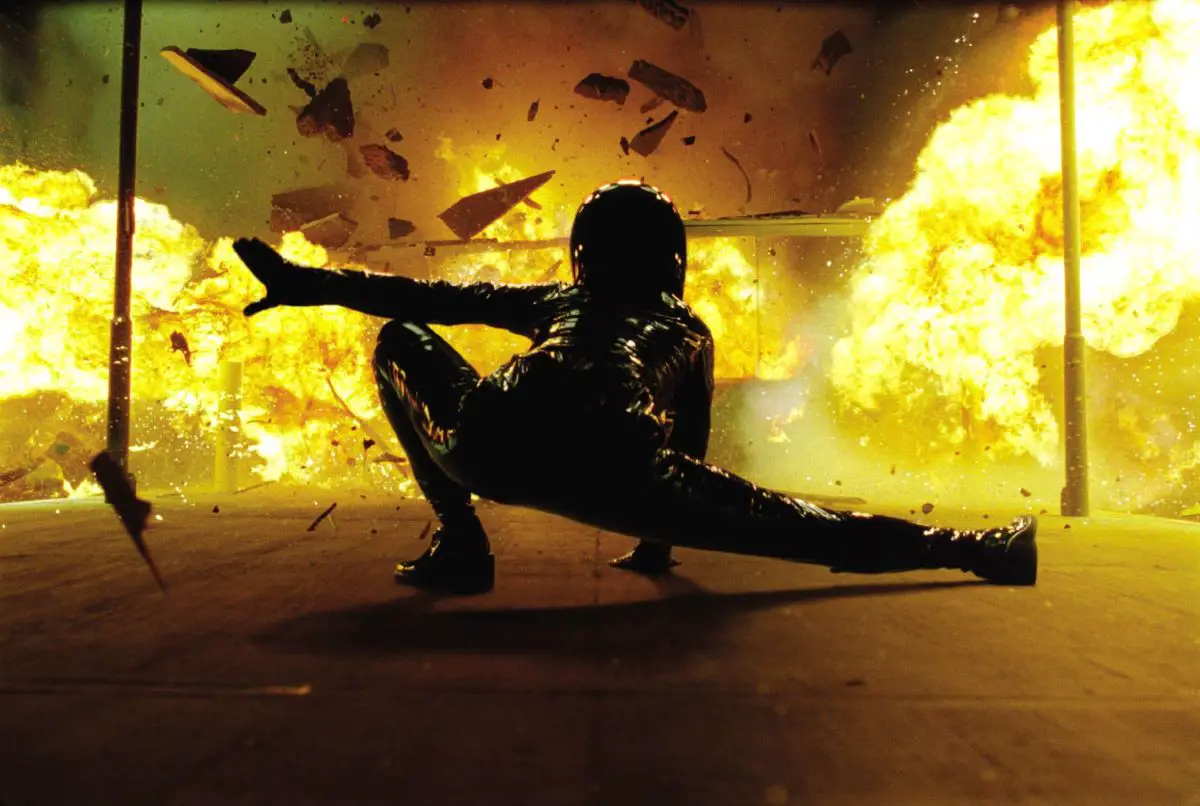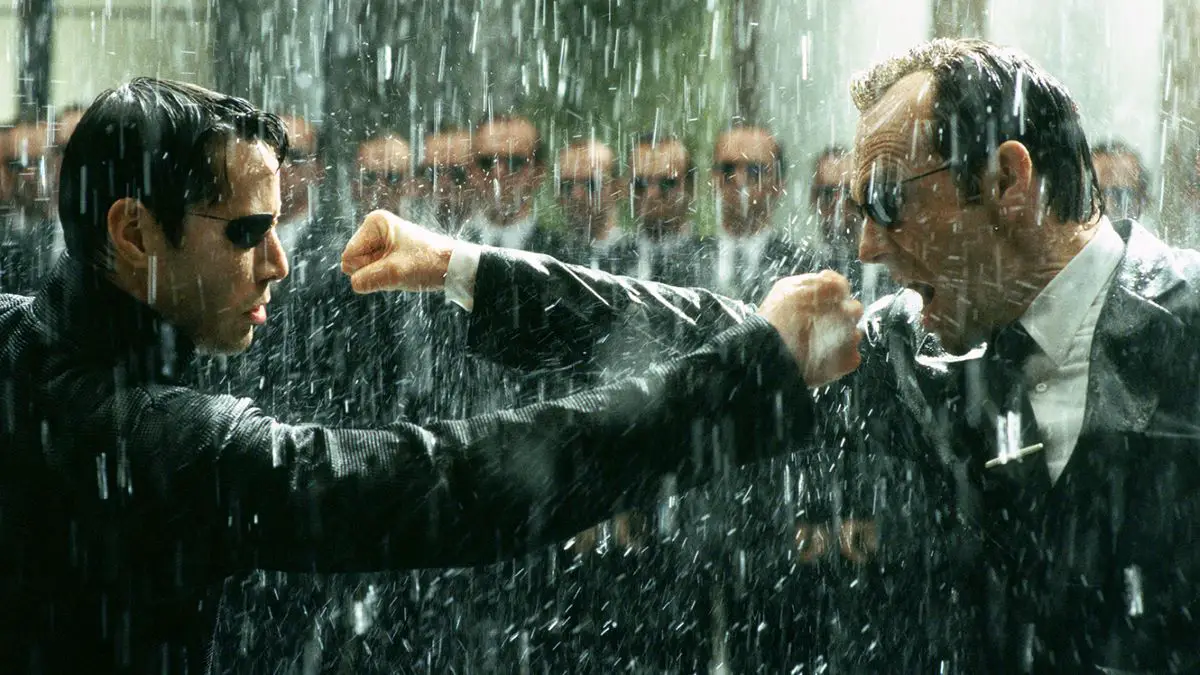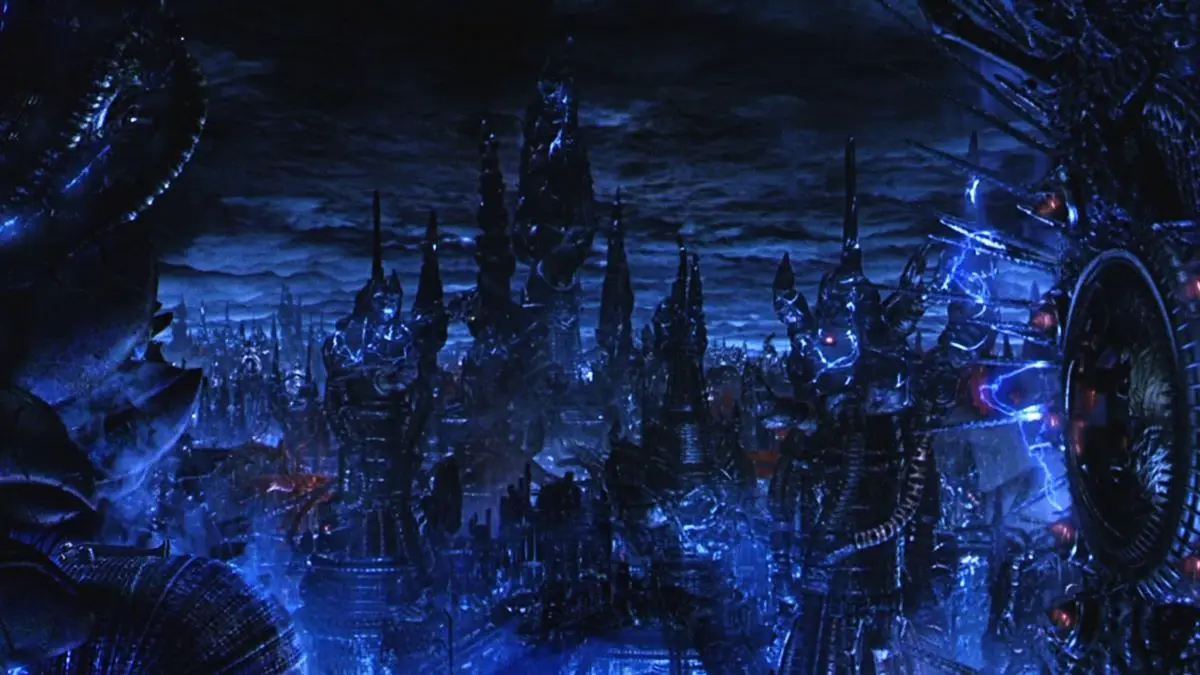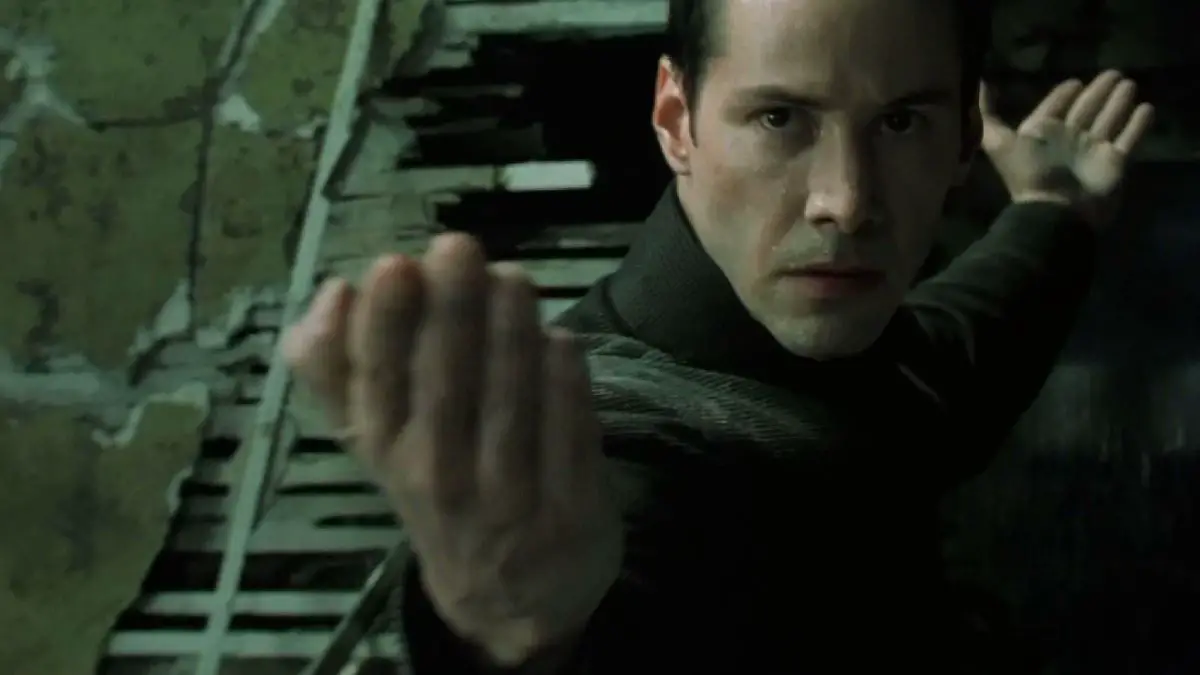In the year 1999, as the world geared itself up for what was sure to be the cinematic event of the year in Star Wars Episode 1: The Phantom Menace, a smaller, more moderately budgeted sci-fi film appeared. An enigmatic trailer asked us “What is the Matrix?” and then showed us robots, kung fu, guns, and people moving very strangely as they dodged gunfire. The Matrix, when released that spring blew everyone away. It was met with critical love and audiences went back multiple times. Its unique blend of sci-fi tropes, Hong Kong-style action, anime influences, and philosophy wasn’t something we had seen before. What could have been an almighty flop turned out to be exactly what audiences wanted at the end of the millennium, and the mysterious Wachowski siblings were suddenly a hot commodity.
Now that the first movie is 20 years old, watching it back now it’s amazing how well it stands up. Not just as a work of effects pioneering cyberpunk coolness, but also as a great piece of writing. The structure is kind of a superhero origin story, but it manages to pack an awful lot of dense world-defining information as well as great pace into a two-hour movie. The final act of the film is like a masterclass in how to write a final act and should be taught in screenwriting classes everywhere.
It seemed like an age between Neo flying off after becoming the One in 1999 and the release of the first sequel The Matrix Reloaded in May 2003. Things were different back then though, they didn’t have all the already-proven properties with ready-made sequels filling the multiplex. The first Matrix was a gamble, and so although a trilogy may have been planned, it wasn’t necessarily guaranteed and they never anticipated the success of the first film. It was announced fairly early on that the next two films completing the trilogy would be filmed back to back. The production made some interesting noises about doing something new in terms of the effects, and the internet was full of theories and buzz about where the saga would go.

2003 rolled around and the excitement started to build. Self-published books emerged around the philosophy of the first movie (I read some), a great game called Enter the Matrix appeared on consoles that tied into the new movie, and The Animatrix, a series of animated shorts came out on DVD and fleshed out the rich sci-fi world even further. Finally Reloaded hit the cinemas early that summer.
After seeing the first movie four times in the cinema in 1999, I had to go see The Matrix Reloaded on opening day. I sat there and watched, glued to the whole thing, trying to anticipate what was going to happen and what certain lines meant. The Wachowski’s further developed the world they had created by introducing the concepts of other wayward programs and tying them into real-world myths. There was an incredible freeway chase set-piece and then there was that perplexing encounter with The Architect, and a total rug pull at the end which left us all hanging. There was a feeling though that something was amiss walking out of that second movie. Something didn’t feel quite right, and I didn’t go back to see it a second time whilst it was still in cinemas. I really thought I would have gone back at least twice more before I saw it.
I didn’t have the internet at home in 2003, I had parents that were fairly backward when it came to technology and I was still living at home. I seem to remember Reloaded got positive reviews in the mainstream press, but it wasn’t until later that I became aware that there was something of a backlash to it online. There was this guy called Harry Knowles back then, and what he said had a hell of a lot of influence even if it was incoherent most of the time, he hadn’t liked the sequel and it felt like nerds everywhere had followed suit.

Although my lingering feelings about Reloaded hadn’t really been given form yet, I was still invested enough to go back and catch The Matrix Revolutions on its opening day as well. I felt instantly that Revolutions was a far superior film, but its content and narrative finally gave me context for how I felt about Reloaded. Revolutions is less concerned with further world-building and more about getting on with it in terms of the saga. It felt more alive, more vital and I loved the conclusion of Neo’s journey and where things sat in terms of the ending. On the way home, however, I found I was alone in this opinion…
It was almost a full-blown argument and loss of friendship travelling back from the cinema that night. My friends were borderline angry at the film for the fact that it didn’t provide them with the conclusion they wanted. The machines were not vanquished and were not conquered by “The One” and the war was at an uneasy truce stage. I tried to make the case that what they wanted was just not achievable in the world that The Wachowski’s presented. A world with a very small percentage of humanity left and machines covering the globe was never a war that humanity was going to win. The best that could be hoped for realistically was the ending we got. My pals were having none of it, and their anger simmered the whole way home. I never brought up the subject again.
It seems that the general consensus is that Revolutions is a worse movie than Reloaded, but that’s not a belief I have ever really subscribed to. People by and large did not agree, however, and the film had a massive drop off in its box office after opening strongly in November of 2003. It was so sharp a decline that there was briefly online scuttlebutt about Warner Bros bringing the movie out on DVD before Christmas to try and make up some of that missing money they had counted on. At the end of the year, the general feeling that 2003 was supposed to be the year of The Matrix had gone away, and a sense of disappointment lingered around the sequels.
It was subsequent viewings of Reloaded on DVD and then seeing Revolutions that finally made me realise what it was that doesn’t work about the sequels. Mainly it is two things: Zion, the last human city, and the fact that Reloaded is very much the middle film in a three-film story, so it feels difficult to evaluate as a stand-alone piece. I could always get past the fact that Neo doesn’t really do anything godlike apart from flying and more kung fu because it made sense with the concept of The One being another form of machine control. Zion is a bit more of a tricky problem.

In the first movie, Zion is spoken about as being the last human refuge in a world that is dominated by the machines. We don’t see it, it’s just kind of in the background and spoken about. Seeds are sewn for where the story would go with Agent Smith (Hugo Weaving) turning Cypher (Joe Pantoliano) in order to get to Morpheus (Laurence Fishburne) and then access to the Zion mainframe. You could see where the Smith character goes and who he inhabits as a kind of conclusion to this mission in the sequels. When we get to see Zion in Reloaded, it’s depicted with a seeming overabundance of cotton, steam and metal tubing. The characters we meet are fairly boring, filling old stand-bys of idealistic kid in a war, ruthless no-nonsense military man, kindly old politician with an open mind, and then literally characterless wives and girlfriends. When met with the knowledge that they are about to be exterminated by the machines once and for all, they don’t prepare or panic, they have this really long rave/orgy. Nothing about anyone or anything in Zion made me care about their fate beyond it being the last vestige of humanity. This becomes a huge problem when the sequels are literally all about a countdown to extinction.
Reloaded has a massive pacing problem. After a strong start where we are back on familiar ground, it slows to a crawl when we get to Zion. It doesn’t pick up again until around an hour in when we travel back to the Matrix itself and get some kind of inkling about the mission at hand. Then it’s set-piece after set-piece as Neo first encounters multiple Agent Smiths, who seems to have lived up to the AI menace shown in the first movie, and then the Merovingian, a fascinating character who we don’t know enough about, and then, of course, there is the much-parodied Architect scene. The problem is Zion has left such a bad taste in the mouth, and the initial “burly brawl” with multiple Smith’s has some shoddy effects work. Up until the scene with the architect and the big twist, things have all felt a bit weightless.
So let’s talk about the big twist. The end of Matrix Reloaded reveals to us that Neo and the concept of The One is, in fact, all a ploy to get humanity to a certain point so that the machines can wipe them out and start again. The architect tells us in a smug wordy fashion that Neo has to make a choice and he makes a choice borne out of love rather than thinking about humanity as a whole. The architect expresses a certain amount of perplexity at this which becomes important later on. Regardless of the eventual destination, it’s pretty incredible when you think about it that the Wachowski’s can build all that mythology in the first movie and then go ahead and tear it all down in the next film. I can’t think of another mainstream blockbuster that has ever done that. Ultimately though it reveals a lot about the themes of the films as a whole: freedom, and choice.
This is why Revolutions has always worked better for me as a film. Zion is still there and takes up more of the film in fairly weightless war scenes, but Neo’s journey and where this is at the start of the film feels altogether more vital and important. After that ending in Reloaded, you truly have no idea where Revolutions will go. Despite prophecies being false and manufactured, Neo does actually end up saving humanity and ushering in a new era. His final fight with the omnipotent version of Agent Smith has added gravitas and Smith’s puzzlement as Neo doesn’t give up brings home the message wonderfully. As we have learned through some characters Neo encounters who are actually programs, the machines have evolved just like humans have, concepts like love and compassion are no longer alien to them. It’s believable in this world that through observing sacrifice in the name of love, machines could well view humanity differently. So when you think about it, where the trilogy ends is perhaps the only place it could have ended.

Despite the air of disappointment that surrounds them, the Matrix sequels do contain some of the best scenes in the whole trilogy. Neo entering the machine city of 01, the final fight with Smith, the scene with the Architect, and the freeway chase are all incredible. It was perhaps a case of having too much money with the sequels. The first film was budgeted at just 70 million which was very low at the time for a film of that type, but it forced the Wachowski’s into a kind of inventiveness with what they had. It’s why the fight scenes in the first movie have more heft and grit than anything in the sequels. In the next two, money is seemingly no object, and so the rules don’t apply, but just because they could doesn’t mean they should, so the weight isn’t really there in the action scenes until the finale where the stakes are appropriately huge.
With 2019 being the 20th anniversary of the first film, it feels like the Matrix sequels are also getting a re-examination. Although time has not been kind to the visuals necessarily, it does feel like the themes of the films are more relevant than ever in these troubled times. The first film being seen as a trans allegory is now more in focus due to the transitioning of both Wachowski siblings from male to female. There are probably countless other parallels that can be made in the sequels thanks to its dense plotting and reveals. On the whole, the Matrix sequels are more than worthy of a rewatch if not a re-appraisal and didn’t deserve much of the hate back in 2003.
It was announced recently that Lana Wachowski is coming back to the franchise with a fourth movie to be released in 2021, with Keanu Reeves and Carrie Anne-Moss also now both involved after a reboot was touted some time ago. Where it will go is anyone’s guess, but it is bound to be as fascinating and thought-provoking as the films that preceded it.




This was a great read and very fair to both films. When they came out I felt like I was in the minority of people who actually liked them. I think, combined with the animatrix, they can be fun to watch back to back. I am looking forward to seeing what they do with a new movie, I’ve always thought there were lots of possibilities